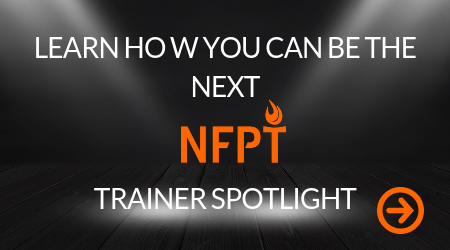Meet Jason Fitzgerald of Burlington, Vermont. With over 20 years as a NFPT-CPT and exercise physiologist, Jason Fitzgerald has extensive experience in individualized fitness program design, rehabilitative exercise, and clinic management. He is also a certified Peak Flow breathwork coach and is currently a Direct Care Specialist and Breathwork Instructor at Sana, a drug and alcohol rehabilitation center in Stowe, VT.
Jason’s deep understanding of the physiological functions of the body combined with his breathwork training enables him to customize his teachings to enhance overall breathing functionality and support and regulate the nervous system. This approach helps his clients balance anxiety, process trauma, and manage acute levels of stress.
Read on to learn more about Jason’s background and how his practice is changing lives.
Jason, how long have you been certified with NFPT, and what made you choose it?
After graduating with my B.S. in Exercise Physiology 20 years ago, I wanted to continue to expand my knowledge in the fitness field. NFPT offered a comprehensive view of exercise prescription as well as a solid overview of all health and wellness-related topics.
Why did you decide to become a fitness professional?
As a former college athlete exercise and movement have always been an important part of my life. Becoming a personal trainer has allowed me to share my knowledge and passion for exercise.
How you are currently utilizing your personal training certification?
My NFPT-CPT has allowed me so many opportunities over the past 20+ years. I have had the privilege of running fitness centers, working with Chiropractors and PT, creating pre-employment screening programs for a variety of businesses and now in the recovery space with amazing people working on changing their lives. The use of exercise (movement) along with breath work has allowed me to help create healthier lifestyle paths for so many individuals.
There is amazing science behind the physiology, psychological, and biological benefits to specific breath work practices and protocols. I have been able to use breath work in collaboration with movement and exercise to maximize outcomes.
Breath work has also been shown to allow us to move from a fight or flight (sympathetic) into a more relaxed state (para-sympathetic).
There is also amazing research around the use of specific breath hold protocols and movement to help dramatically improve exercise and sports performance. These protocols help increase the ability to tolerate a buildup of CO2 in titrated doses with specific rest intervals creating similar adaptations to training at altitude. The breath is a powerful tool!
What is the biggest challenge for you as a personal trainer?
It’s challenging to see the fitness industry explode financially while Americans continue to become sicker with heart disease, cardiovascular disease and obesity. We are failing our fellow humans.
What has been your most rewarding experience as a personal trainer?
My rewards are small and constant. I have the honor of sharing my knowledge with others every day. Fitness/wellness is expansive. I am driven to keep learning and helping the community around me benefit from advances in science-based wellness.
What has been your biggest achievement in the fitness industry?
My biggest achievement as a trainer would be how I have inspired other through my actions to become more heath aware. I believe in the power of exercise and how it can positively affect our mental and physical well-being.
How has social media played a role in your fitness business?
None!
Word of mouth and placing myself in specific situations where I have the ability to connect with like-minded individuals has been key for my professional success. I have put a lot of energy into reaching out to individuals, businesses, sports teams and people in the recovery world to teach them the benefits of exercise and breath.
Any advice for people thinking about a career in fitness?
My advice to anyone considering a career in fitness is to be dedicated to continued learning. It’s important to follow the constantly changing science and also take time to learn how to be an effective communicator.

What does the future hold for you and the fitness industry?
I have spent many years focused on movement and the adaptations to our bodies (it’s a beautiful science). Moving forward I am putting a lot of my focus on how exercise affects humans cognitively and from a neurological standpoint. We are in a mental health crisis in our country and exercise and breath work can be tools to help neuro-regulate our clients
As NFPT Blog Publisher from 2019 to 2024, and a veteran health and fitness trainer for over 20 years, Michele G Rogers, MA, NFPT-CPT, I-HTMAP, now serves as a Holistic Health Navigator and Practitioner, helping people improve their overall health utilizing Hair Tissue Mineral Analysis as a data-anchor. This functional medicine screening test enables clients to connect their physical symptoms to their emotional, cognitive, and spiritual health. She holds a master’s degree in applied health psychology from Northern Arizona University and multiple health certifications. Follow Michele on Instagram or find out more about her services at www.encompasspathways.com




